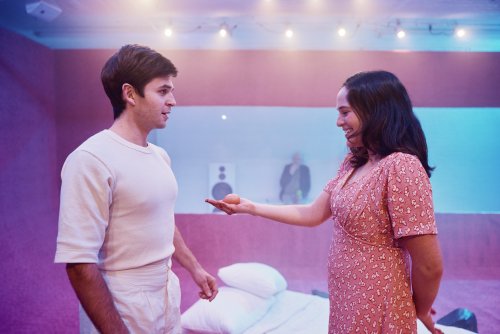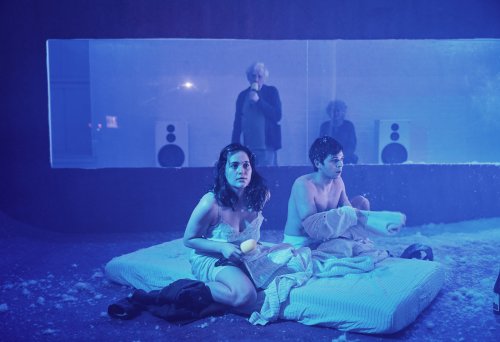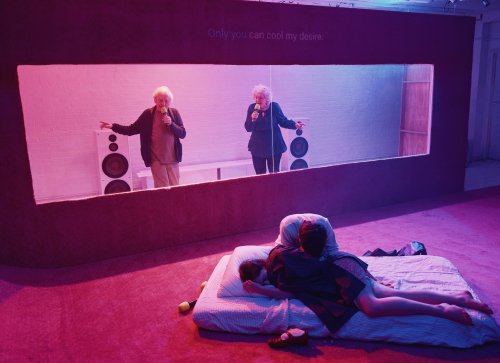This Beautiful Future
A German soldier and a French woman’s teenage romance in Occupied France is depicted in this haunting play that’s been given an entrancing production.

Justin Mark as Otto and Francesca Carpanini as Elodie; Austin Pendleton (background) in a scene from Rita Kalnejais’s “This Beautiful Future” now at Theaterlab (Photo credit: Emilio Madrid)
[avatar user=”Darryl Reilly” size=”96″ align=”left” ] Darryl Reilly, Critic[/avatar]
Everything he says makes so much sense. I had tears just everywhere. And I was trying to clean myself up before anyone saw but then I looked up and my dad was…he was weeping and all the people around me. It’s like he’s saying what you haven’t even let yourself admit but you’re like Thank you.
This appreciation of Adolph Hitler is delivered by a 16-year-old German soldier from Dusseldorf in author Rita Kalnejais’ haunting romantic play, This Beautiful Future. First presented in London in 2017, this shimmering U.S. premiere affirms its acclaim. The Australian-born Ms. Kalnejais’ writing is highly crafted, imaginative and affective. Kalnejais was inspired by a 2016 museum exhibition containing W.W. II-era film footage to create this entrancing historical tale during a sense of worldwide political chaos. “I wanted to write something hopeful and delicious and gorgeous and put something gorgeous out into the world,” she has said in an interview.
It’s August 1944 in an Occupied France village; we witness a “meet cute” between the ardent teenage Nazi Otto and the spirited 17-year-old French woman Elodie. Much of the play’s action takes place in the bedroom of an empty house during one night where the couple get to know each other, fall in love and have sex. Kalnejais’ lyrical dialogue captures the dimension of young love while depicting the couple’s complicated situation with chilling realism.

Francesca Carpanini and Justin Mark (foreground); Austin Pendleton and Anglina Fiodellisi (background) in a scene from Rita Kalnejais’s This Beautiful Future now at Theaterlab (Photo credit: Emilio Madrid)
“Have you killed lots of people?” asks Elodie. Assigned to a firing squad, Otto details the executions of townspeople that he participated in, several of whom Elodie knew. He explains that her missing Jewish neighbors will not be returning home and extolls “a future where everything is clean for one race.” Immature love knows no bounds.
A mirthful, ambiguous and dynamic counterpoint is Kalnejais’ theatrical device of having an aged man and woman appear in her play singing karaoke renditions of vintage songs as well as hits by Adele and Bruce Springsteen. The beaming Angelina Fiordellisi and Austin Pendleton are delightful as this cryptic duo who inspire the audience at one point to sing along.
The captivating performances of Justin Mark as Otto and Francesca Carpanini as Elodie fully realize these characters. Much of the time swaggering around in white boxer shorts and a white athletic shirt, the lithe boyish Mr. Mark with his charming presence and expressive voice projects youthful masculine bravado, adolescent confusion and tenderness. The animated Ms. Carpanini’s sunniness, girlishness and demonstration of a range of feelings all enrich her soaring portrayal. Mark and Carpanini believably suggest emotional and physical intimacy and amorous playfulness while having a pillow fight and imitating cats.

Francesca Carpanini and Justin Mark (foreground); Austin Pendleton and Anglina Fiodellisi (background) in a scene from Rita Kalnejais’s This Beautiful Future now at Theaterlab (Photo credit: Emilio Madrid)
In addition to guiding the cast to exceptional results, director Jack Serio’s swift physical staging and inspired usage of accomplished production elements majestically fulfill Kalnejais’ memory piece vision. We’re clearly experiencing the past from the viewpoint of the present due to Mr. Serio’s achievement.
The floor of the wide rectangular playing area is adorned with scenic designer Frank J. Oliva’s striking rose-colored carpet, which is set with a bed and minimal props, all surrounded by gray and white walls and slatted floor, and there’s the prominent karaoke booth in the rear of the stage. Stacey Derosier’s vigorous lighting design evokes a dreamy landscape in concert with Lacey Erb’s skillful projection design. Battle and crowd sounds are joltingly rendered by sound designer Christopher Darbassie. The characters’ authentic appearances are aided by Ricky Reynoso’s artful period-style costume design that includes a 1940’s military uniform. Music director Emily Erickson’s efforts enhance the song sequences.
The eternal notion of “boy meets girl” is taken to ravishing heights in This Beautiful Future.
This Beautiful Future (through January 30, 2022)
Theaterlab, 357 West 36th Street, in Manhattan
For tickets, call 212-929-2545 or visit http://www.theaterlabnyc.com
Running time: 75 minutes without an intermission






Leave a comment